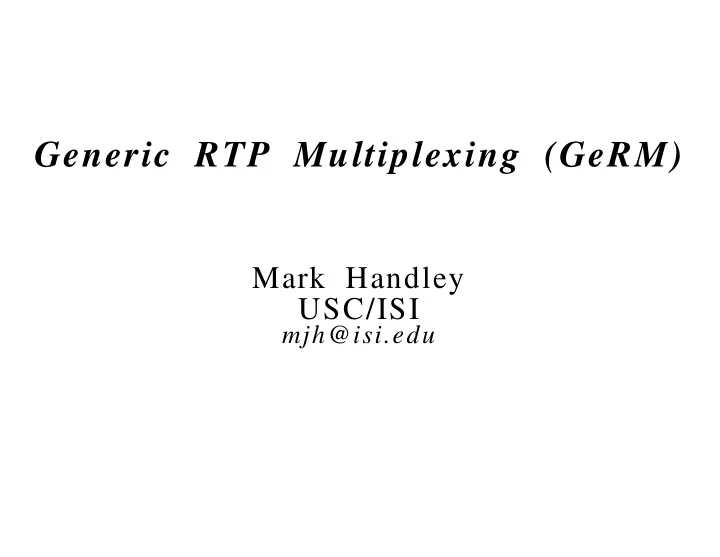

Generic RTP Multiplexing (GeRM) Mark Handley USC/ISI mjh@isi.edu
Goals To be able to multiplex generic RTP streams When gateways cooperate, to have an overhead as low as one byte per multiplexed payload. When gateways don’t cooperate, overhead depends on which traffic gets multiplexed together. Worst case: no worse than full RTP header per payload.
Status First idea during Chicago IETF. Internet draft now available name changed from MuRGE to GeRM. No changes required from Chicago slides. Just improved the explanation and corrected typos.
GeRM Difference Coding Payload Payload RTP Header Payload 2 Header 1 Header 2 Payload 1 PT=murge code differences code differences code differences
RTP Header 0 8 16 24 V=2P X CC M PT sequence number timestamp synchronization source (SSRC) identifier contributing source (CSRC) identifiers ....
GeRM Header 0 8 16 24 V=2P X CC M PT sequence number timestamp synchronization source (SSRC) identifier contributing source (CSRC) identifiers .... 0 8 length
GeRM Bits Bit 0: zero=>Byte 1 unchanged (V=same, P=zero, CC=same) one=>Byte 1 follows. Bit 1: zero=>PT unchanged, one=>PT follows Bit 2: M bit Bit 3: zero=>seq number unchanged Bit 4: zero=>timestamp unchanged Bit 5: zero=>SSRC (3 MS bytes unchanged) Bit 6: zero=>SSRC (LS byte increased by one) Bit 7: zero=>length unchanged one=>one byte length field follows
Usage GeRM can be used between gateways with no additional signalling. Approx 11 bytes per payload, vs 40 for IP/UDP/RTP. GeRM can be used with an additional signalling protocol that performs SSRC/SeqNo/Timestamp mappings. Can reduce overhead to 1 byte per payload in the limiting case of same PT, same length payloads, no holes in the (mapped) SSRC space. Normal case for POTS->IPTEL->POTS would be approx 7 bytes if mapping is only done at call startup.
GeRM signalling If we decide that this approach is promising, we should probably also specify a gateway->gateway signalling protocol. Allow robust SSRC mapping at call startup. Allow robust SSRC remapping when call terminates and leaves a space in the SSRC space. May not be required if call startup rate is high. Allow seqno remapping? More difficult - issue is one of silence supression. Allow timestamp remapping due to clock drift? Only an issue for RTP not generated at the gateway.
What Are Our Goals? If we want a single mux protocol, probably we want something like GeRM. If we really care about a couple of bytes per payload, GeRM may not be efficient enough. Probably have to have several different special purpose multiplexing protocols. I’m not going to push GeRM forward without concensus from this group that a general RTP multiplexing protocol is needed. What’ s the concensus?
Recommend
More recommend